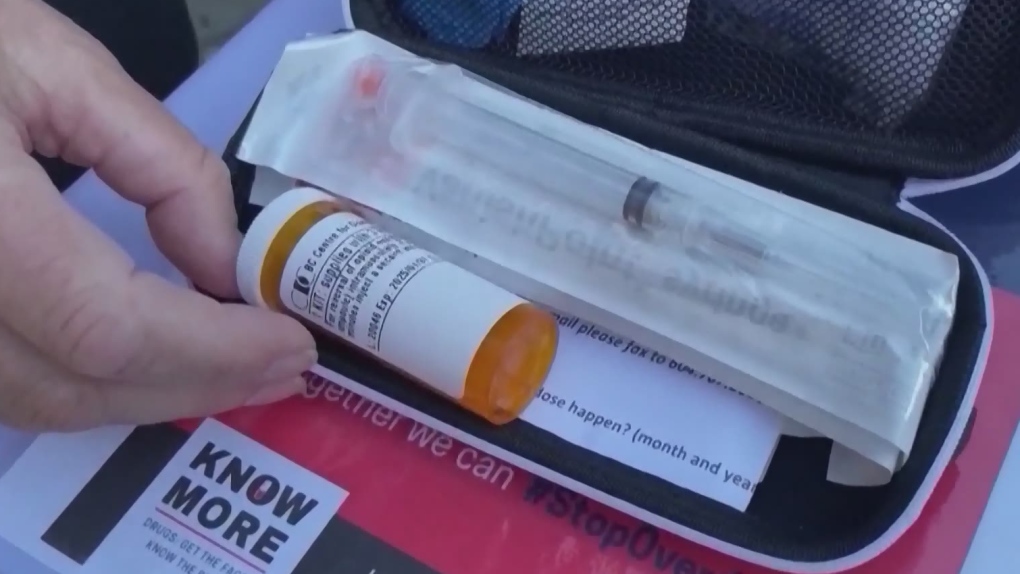What the latest data tells us about B.C.'s toxic drug crisis

Between January and July this year, at least 1,455 British Columbians lost their lives to toxic drugs, the highest number ever reported in the first seven months of a calendar year, according to the latest data from the BC Coroners Service.
Unregulated drugs accounted for 198 deaths in July—about 6.4 deaths per day—marking the 13th consecutive month the province lost more than 190 people to the crisis.
The monthly summary released Tuesday shows a five per cent decrease in deaths compared to last July, and a four per cent increase compared to June.
“I am saddened to once again report that British Columbia's toxic drug crisis shows no signs of abating," chief coroner Lisa Lapointe said in a statement accompanying the data.
"We are continuing to experience record numbers of deaths province-wide because of the toxic drug supply. The unregulated illicit market is highly unpredictable and continues to put thousands of lives at risk each month.”
Fentanyl and its analogues were detected in 88.4 per cent of illicit drug deaths recorded in July.
Thursday is International Overdose Awareness Day, Lapointe noted, a day to remember the family, friends, colleagues and neighbours who make up the death toll.
“While we honour their memory and grieve alongside their loved ones, we must urge decision-makers to do more to stop these preventable deaths from occurring. The critical risks and losses of life resulting from this public health emergency deserve an urgent response. We must not accept the continued loss of six lives each and every day,” she said.
Lapointe continued to push for an expansion of safer supply, saying that “very few” people have access to a lower-risk alternative.
The BC Coroners Service says it finds no evidence that prescribed safer supply is contributing to unregulated drug deaths.
Since the overdose crisis was declared a public health emergency in April of 2016, at least 12,739 British Columbians have died from toxic drugs.
WHO IS DYING?
In July, the majority of people who died—83 per cent—were male, which is slightly higher than in previous months, but still consistent with the trends over the past year.
Sixty-six per cent of people were between the ages of 30 and 59, which is also in line with the rest of the year’s data.
Three people under the age of 18 died from illicit drug use in July. The highest recorded number of fatalities for people in that age group was in April, when five died.
According to the coroners service, drug toxicity is the leading cause of death for people aged 10 to 59 in B.C.—higher than homicides, suicides, accidents and natural disease combined.
WHERE ARE PEOPLE DYING?
In the first seven months of 2023, the coroners service says the Vancouver Coastal, Island and Interior health authorities are seeing higher death rates than ever previously recorded.
While Vancouver Coastal Health and Fraser Health have seen the highest number of deaths in 2023—432 and 397, respectively, making up 56 per cent—Northern Health has the highest rate of death at 59.8 per 100,000 this year.
For the month of July, Interior Health had the highest death rate at 5.3 per 100,000, followed by Vancouver Coastal at 4.3 per 100,000.
The coroners service notes that the highest number of deaths occurred in urban centres such as Vancouver, Surrey and Greater Victoria. The health service delivery areas of Central Vancouver Island, Northern Interior, Northwest and Greater Nanaimo are also among the most impacted.
So far this year, 80 per cent of unregulated drug deaths occurred indoors, with 47 per cent happening in private residences and 33 per cent in “other residences,” which includes supportive housing, SROs, shelters and hotels.
CTVNews.ca Top Stories

opinion Tom Mulcair: Prime Minister Justin Trudeau's train wreck of a final act
In his latest column for CTVNews.ca, former NDP leader and political analyst Tom Mulcair puts a spotlight on the 'spectacular failure' of Prime Minister Justin Trudeau's final act on the political stage.
B.C. mayor gets calls from across Canada about 'crazy' plan to recruit doctors
A British Columbia community's "out-of-the-box" plan to ease its family doctor shortage by hiring physicians as city employees is sparking interest from across Canada, says Colwood Mayor Doug Kobayashi.
'There’s no support': Domestic abuse survivor shares difficulties leaving her relationship
An Edmonton woman who tried to flee an abusive relationship ended up back where she started in part due to a lack of shelter space.
Baseball Hall of Famer Rickey Henderson dead at 65, reports say
Rickey Henderson, a Baseball Hall of Famer and Major League Baseball’s all-time stolen bases leader, is dead at 65, according to multiple reports.
Arizona third-grader saves choking friend
An Arizona third-grader is being recognized by his local fire department after saving a friend from choking.
Germans mourn the 5 killed and 200 injured in the apparent attack on a Christmas market
Germans on Saturday mourned the victims of an apparent attack in which authorities say a doctor drove into a busy outdoor Christmas market, killing five people, injuring 200 others and shaking the public’s sense of security at what would otherwise be a time of joy.
Blake Lively accuses 'It Ends With Us' director Justin Baldoni of harassment and smear campaign
Blake Lively has accused her 'It Ends With Us' director and co-star Justin Baldoni of sexual harassment on the set of the movie and a subsequent effort to “destroy' her reputation in a legal complaint.
Oysters distributed in B.C., Alberta, Ontario recalled for norovirus contamination
The Canadian Food Inspection Agency has issued a recall due to possible norovirus contamination of certain oysters distributed in British Columbia, Alberta and Ontario.
New rules clarify when travellers are compensated for flight disruptions
The federal government is proposing new rules surrounding airlines' obligations to travellers whose flights are disrupted, even when delays or cancellations are caused by an "exceptional circumstance" outside of carriers' control.

































